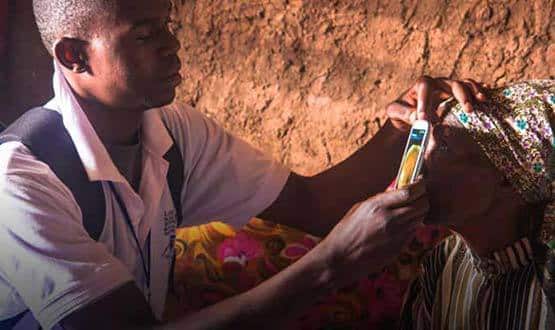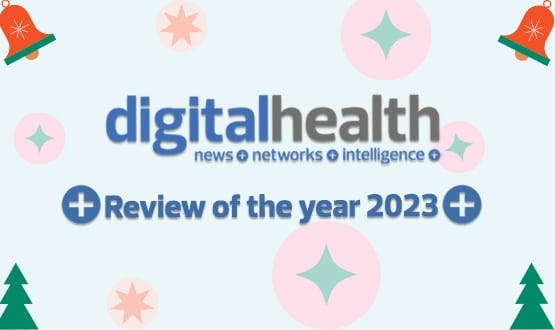Developing a new way of doing healthcare

Pneumonia is responsible for more deaths of children under five than any other infectious disease. Quick diagnosis is essential if it is to be treated effectively, but in developing countries diagnostic tools are in short supply.
Using technology developed by the University of British Columbia, LionsGate Technology has produced a pneumonia diagnostic kit that can be used in the community: a pulse oximeter that attaches to a smartphone.
Users put their finger on the end of the device and the phone displays blood oxygen level readings. The phone can also be connected to other medical sensors to identify other problems including, for example, whether a pregnant women is at imminent risk of pre-eclampsia.
In Mozambique, healthcare workers with relatively little training are visiting women living in remote areas, identifying those at risk and making sure they attend the nearest clinic.
Mobile drives change
The LionsGate technology embodies two significant trends. One is the realisation that mobile technology has tremendous potential to change the way healthcare is provided: there are now 165,000 mobile health apps on the market.
As Loki Jorgenson, LionsGate’s chief technology officer, says, smartphones can act as “general purpose computing platforms” that offer new models for “diagnosis, prevention and risk assessment”.
The other is that mobile technologies can have particular value in developing countries, where a lack of robust healthcare infrastructure makes them obvious sites for testing out alternative means of providing healthcare services.
Julie Bretland, director of consultancy Our Mobile Health, says: “In countries where transport infrastructure is lacking and the ratio of doctors to people is low, providing access to health services through the mobile phone makes sense.”
Mobile innovation doesn’t just offer governments a cheaper means of providing healthcare. It also makes for an attractive business proposition; there’s a big market gap to be filled.
As a plus, developing countries offer the opportunity to try out ideas that, with some tinkering, could work in developed countries with what might be called legacy healthcare infrastructure.
Apps, not doctors?
Take two apps using artificial intelligence: Your.MD and babylon. Your.MD is a personal health assistant: users type in questions about their symptoms and the app recommends a course of action, based on the probable diagnosis.
Unlike the service offered by NHS 111, which takes users through a flowchart, eliminating certain possibilities at each question, Your.MD uses Bayesian logic to work out what the problem is likely to be. The more people who use the app, the better the quality of the advice.
Managing director Matteo Berlucchi thinks the app will catch on in the UK and other developed countries because of the intense pressure on the health service but adds: “In the developing countries there's going to be a faster uptake because the problem is more acute.”
Babylon, founded by former Circle chief executive Ali Parsa, has just launched an AI diagnostic tool. But it already has a more established subscription service in the UK that enables users to consult a GP or specialist over their smartphone, which it plans to expand to Rwanda later this year.
Other African countries may follow. The most likely route to success is through collaboration with governments: Parsa’s argument is that providing remote consultations over the phone is much less costly than building new clinics and training doctors and healthcare workers to staff them.
“We think we can create an affordable health service,” says Parsa. “Anybody who wants it can pay for it – that's a much better way than going and begging money from an NGO.”
Working with what’s there
Both Your.MD and babylon are targeted at patients. But several other organisations, like LionsGate, aim to equip health workers with the tools to perform diagnoses in remote areas that have established health services; but thinly spread ones.
Peekvision, for example, uses the full capability of the smartphone to enable community workers to carry out eye examinations in remote settings. The app, named Peek, uses the phone’s camera to scan the lens of the eye for cataracts and the flash to check for disease in the retina. Patients’ vision can be tested through a shrinking letter on the screen.
In a pilot in Kenya, 25 trained teachers were able to test the eyesight of 20,000 children in two weeks and refer those with eye problems to specialists. The key to success, says founder Andrew Bastawrous, is “an already functioning health system.
“If there are no service providers, a smartphone becomes a redundant tool,” he argues. But the beauty of the technology is that it makes it possible to reach far more patients, far more quickly, than traditional methods.
Bastawrous says that there have been numerous enquiries about using Peek in the NHS, as well as in Europe and the US, because: “Any tool that creates efficiency and lowers costs is likely to be advantageous.
“Many general doctors don’t have tools that enable an eye examination to be performed with confidence. The ability to objectively measure vision and take images of the eye, which can be then shared with an expert, has great potential in primary care settings.”
Finding partners
Another healthcare business, Aptus Health, provides a medical decision support app, Omnio, that is marketed to healthcare professionals in the West.
Founder Donato Tramuto set up the charity Health eVillages to provide healthcare workers in remote villages in Kenya, Uganda, South Sudan, Haiti, India and even the US with tablets pre-loaded with relevant information from Omnio.
It also provides training in how to use the information, so that healthcare staff who may have previously had access only to out-of-date medical textbooks now have access to comprehensive, up-to-the minute resources.
In one Kenyan village, Lwala, 80 villagers were trained as community health workers and given tablets with the app, enabling them to identify pregnant women and send the information wirelessly to the community health centre, resulting in an increase in the proportion of women giving birth with medical help from one in four to 97%.
Tramuto stresses that interventions such as Omnio can be effective only if there are collaborative partners supplying other pieces of the jigsaw.
In Lwala, for example, Vodafone provided a mobile phone mast: “We're trying to do small things that have the capacity to drive great change. And I think the only way you can do that now is through integration.”
Leapfrogging older systems
So to what extent can mobile apps work in settings that lack a robust healthcare infrastructure? One problem faced by healthcare workers in many developed countries is that it can be difficult to correctly identify a patient and find their health record.
Toby Norman, chief executive of non-profit start-up Simprints, explains: “The patient standing across from the health worker has no birth certificate, no formal ID, no national health number, so just searching for a patient by their name or date of birth was almost impossible.”
The Simprints solution is a fingerprint scanner that takes the patient’s fingerprint, loads it via Bluetooth to the health worker’s mobile phone and locates the electronic health record. Developed in conjunction with Smart Design, the scanner has been designed to be easy and intuitive to use.
The fingerprint scanner is an example of how healthcare in the developing world may be on a very different track from that in the developed world; where healthcare systems have struggled to develop huge electronic patient record systems; and then to link them together.
In developing countries, says Norman, a “huge leapfrog” is happening. Many are using OpenMRS, an open source medical record system supported by the World Health Organisation: “That's finally starting to synch up with the ad hoc multitude of mobile healthcare projects.
“You're looking at collecting health data, collecting digital patient records, even automating things like diagnostic pathways, for frontline healthcare workers doing house-to-house visits in slums or rural villages.”
It could be that patients and clinicians in developing countries will benefit from a high-tech approach to healthcare, with valuable access to relevant data and services, more quickly than their counterparts in the West – even while lacking the modern medical facilities and expertise available here.
Thinking outside the Western box
Whether the mobile technology that is starting to have an impact in places like Kenya and India will transfer to countries with an entrenched healthcare infrastructure remains to be seen. But it’s certainly possible, argues Bretland.
“In the UK, we obviously have an existing world class health care system and infrastructure, but given the current economic pressures on the health service, providing more convenient access to a greater number of people at a potentially lower cost is worth investigating.”



